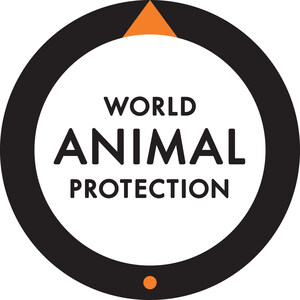NEW YORK, Nov. 6, 2017 /PRNewswire-USNewswire/ -- World Animal Protection, the International Committee for the Recovery of the Vaquita (CIRVA), and Monterey Bay Diving joined forces with local fishermen in San Felipe, Mexico earlier this month to locate illegal gillnets in critical vaquita porpoise habitat. The vaquita porpoise is the world's most critically endangered marine mammal with just an estimated 23 individual vaquitas remaining in the Gulf of California, Mexico. Illegal fishing activity and the resulting abandoned gillnets, also known as ghost nets, are the single biggest cause of the vaquita's near eradication.
The team used unique sonar scanning technology to find discarded nets likely to entangle vaquitas, ultimately removing approximately 2000 square meters of net. This mission was funded by WWF Mexico. The gillnets recovered will be recycled by partners, including Parley for the Oceans, in the Global Ghost Gear Initiative founded by World Animal Protection, for use as nylon-based products.
This most recent mission follows the team's earlier gear recovery expedition in May, during which World Animal Protection, CIRVA, and Monterey Bay Diving removed approximately 5,702 square meters of net. During an entire month of scanning between September and October, the team found significantly less gear than over a similar length of time in May, a hopeful sign that the habitat may finally be safer for these animals – at least until the next season of totoaba fishing begins and the illegal gillnets return, meaning active enforcement of Mexico's gillnet ban remains crucial.
"Ghost nets from illegal fishing activities have driven the vaquita to the point of extinction," says Elizabeth Hogan, U.S. Oceans and Wildlife Campaign Manager at World Animal Protection. "But there is hope that innovative solutions can save them. Finding and removing the nets is crucial for making the vaquita's habitat safer, and we hope the Mexican government continues to enforce this animal's protection in the wild."
The vaquita's critically endangered status is due to illegal nylon gillnets left to catch a fish called the totoaba. Also a critically endangered species, the totoaba is sold illegally in China where its swim bladder is used in traditional medicine. As the illegal totoaba fishery ends for the season once the fish stock has migrated, the abandoned nets often entangle and kill vaquitas.
World Animal Protection, CIRVA, and Monterey Bay Diving located gillnets via a unique application of sonar technology, provided by Monterey Bay Diving, which allowed the team to view a span of up to 200 meters underwater, with accuracy of within 0.1 meters. Once a gillnet was located, the team used underwater grappling to mark the net for removal. The scanned images of the illegal ghost nets that the team located in the vaquita habitat revealed valuable insight into the methodologies used by those fishing illegally and will inform ongoing net recovery efforts by Museo de la Ballena and Sea Shepherd Conservation Society.
"Monterey Bay Diving was pleased to provide our advanced sonar imaging technology to help locate and remove illegal totoaba gillnets and provide forensic data from the sea floor in the Northern portion of the Gulf of California, in an effort to help save the vaquita population," says Jared Berg, President of Monterey Bay Diving. "Monterey Bay Diving is proud to be a part of this project and maintains a strong advocacy of the ocean and its marine life."
World Animal Protection is reducing the suffering caused by ghost gear through its Sea Change campaign. A staggering 640,000 tons of ghost fishing gear is left in global waters each year, killing approximately 136,000 seals, sea lions, and whales, every year, in addition to millions of birds, turtles, and fish. World Animal Protection's Sea Change campaign works to reduce the volume of ghost gear, remove and recycle such gear, and rescue entangled animals.
To watch a video about World Animal Protection's mission to clean up the vaquita habitat, visit https://www.youtube.com/watch?v=t9IlhKy0rEk
About World Animal Protection
World Animal Protection is active in more than 50 countries. From our offices around the world, we work with businesses, governments, local partners and animal welfare organizations. We help people to find practical ways to prevent animal suffering worldwide. We collaborate with national governments, and we have formal relationships with international bodies including the Food and Agriculture Organization of the United Nations, the United Nations Environment Programme, the Council of Europe and the World Organisation for Animal Health (OIE). We seek national and international policy change to improve the lives of millions of animals, because animal protection is a fundamental part of a sustainable future.
For more information on World Animal Protection's work to protect vaquitas, visit https://www.worldanimalprotection.us.org/vaquita-most-endangered-marine-mammal
About CIRVA
The International Committee for the Recovery of the Vaquita (CIRVA) was established in 1996 by the Mexican Ministry of Environment, Natural Resources and Fisheries. CIRVA's primary goal is to develop a recovery plan for the species based on the best scientific evidence. The creation of CIRVA was a critical step towards vaquita conservation.
SOURCE World Animal Protection
Related Links
WANT YOUR COMPANY'S NEWS FEATURED ON PRNEWSWIRE.COM?
Newsrooms &
Influencers
Digital Media
Outlets
Journalists
Opted In





Share this article